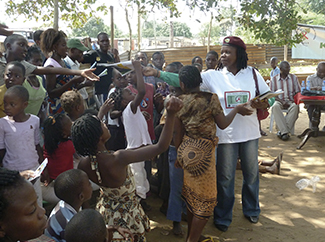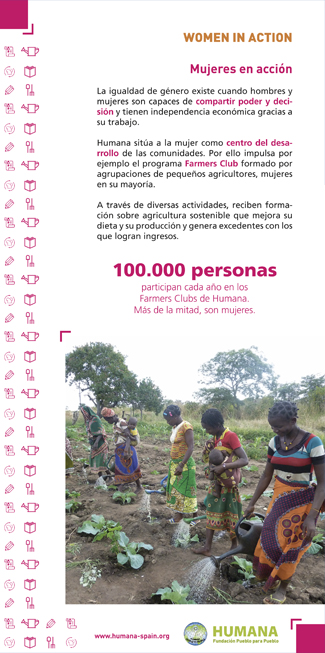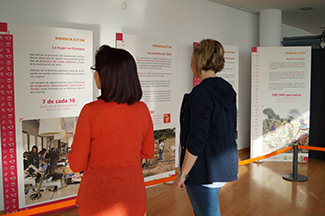consent_cookie
Duración: 1 year
Stores the user's cookie consent state
06-03-2017
On March 8, the International Women's Day is celebrated all over the world. The 2017 theme is “Women in the Changing World of Work: Planet 50-50 by 2030”.
Women have a key role to play in the Sustainable Development Goals (ODS). Many of these objectives have a specific impact on the equality and empowerment of women, a common aspect of the development actions carried out by Humana.
Among others, the ODS 5 proposes:
The marking of the Women’s Day commemoration is coinciding with the 6th – 10th of March 2017 UNESCO Week for Peace and Sustainable Development with focus on The Role of Education. The event is being held in Ottawa, Canada.
The Humana People to People programs
Humana places women as the center of community development. For this reason, for example, the Farmers Club program is formed by groups of small farmers, mostly women. Through various activities, they receive training on sustainable agriculture with which they improve their diet and production and achieve surpluses that allow them to generate income for their families.
Some figures
“Girl Child Stay in School” in Mozambique
The NIKHALAMO project implemented by ADPP Mozambique, a member of Humana People to People, in partnership with Girl Child Rights is making numerous strides helping to retain girls in primary and secondary schools in Zambezia province of Mozambique. The project is bringing back many girls to school.
For example, Bonifacio Gruveta Massamba Secondary School in Macuse, Zambezia province had trouble in retaining grade 8 and 9 girls due to high numbers of teenage-pregnancies. 160 vulnerable girls enrolled in 2016 have been motivated to stay in school due to door-to-door campaigns, follow up and support provided to them. 150 out of 160 girls have remained in school last year, a 96% attendance record.
In addition, the project paid the registration fees for 732 orphaned and vulnerable girls; purchased and distributed school kits (notebooks, textbooks, pens, pencils and rulers) to 840 of the vulnerable girls in the three participating secondary schools. This was an effort to facilitate and ensure that the vulnerable girls stay in school and complete their secondary school studies.
Girls Bridge Education program in India
More than 2 million girls in India are out of school, while 53% of girls between the age group of 5-9 are illiterate. The same age group is noted to have a drop-out rate of 58%. India loses a staggering $56 billion USD a year in potential earnings because of illiteracy among young women. Haryana State is the worst hit as female literacy rate has dropped from 59.61% in 2001 to 56.91% in 2011.
Humana People to People India has established two Girls’ Bridge Education Centres in Rajasthan and Haryana with an aim to educate out of school girls in the 9 to 14 years age group and enroll them in the main stream education. The Bridge Education Centres are designed to also administer practical knowledge among girls with a close relationship to their lives and social set-up.
The three thrust areas of the program are:
The project aims to improve learning outcome of about 8,000 girls from grade 1 to 8 each year along with empowering and elevating the quality of teaching of 245 participating teachers.
Assisting government’s efforts to provide quality education, Humana People to People India’s program dove tails with local education system and nurtures all the critical stakeholders of the education system: the schools, the teachers, the students, the community and the state government.
Empowering Young Women and Girls in South Africa
According to the South African government statistics, in 2015 an estimated 266,000 South Africans became infected with HIV, and each week, there are an estimated 2,000 new HIV infections in adolescent girls and young women aged 15 to 24 years.
“In South Africa, young women and girls aged between 15 and 24 have an unequal risk of becoming infected with HIV. Intergenerational sex is seen as a key driver of the spread of HIV in the country, despite continued efforts and commitment to preventing new infections. Effectively preventing new infections in young women and girls is very complex.
Programmes holistically targeting gender-power disparity, low levels of risk perception, peer pressure to have sex and bear children, and low levels of self-esteem and future prospects must be considered when programming, in addition to the traditional prevention messaging for this key population. Reducing HIV incidence in young women and girls requires a multi-pronged, multi-level approach.” - South Africa National AIDS Council.
Humana People to People South Africa is currently running a Young Women and Girls Program (YWG) across 3 provinces; Limpopo, KwaZulu Natal and Mpumalanga. The program provides a comprehensive package of health and support services for young women, out of school, aged 19-24 years.
Using the RISE Young Women and Soul Buddyz clubs model, the programme aims to empower young women to make healthy choices that promote their wellbeing, promote behaviour change, and encourage them to access Sexual and Reproductive Health services and other relevant social services. The programme also seeks to improve the work-seeker readiness of young women in the programme and link them to job or training opportunities.
Humana People to People has come to note that, though access to quality education and women’s empowerment is crucial to achieving equity, it cannot stand alone. The world need to continue to work more to break down the societal barriers of discrimination and oppression of women. Only then will we be able to achieve true equity in education for men and women across the globe.
Women in Action Exhibition
Coinciding with International Women's Day, the Foundation launches the exhibition 'Women in the Development Center'. It is formed by eight panels of two meters of height, printed in full color on white falconboard of high quality. The expo calls for the importance of women throughout the world to promote sustainable development, in which equity and equality are signs of identity.
At the moment the expo is scheduled from 6 to 12 March in Otura (Granada) and from 13 and 24 of the same month at the University of Huelva.
This exhibition adds to the other two currently available: 'Quality education and development of the countries of the South' and 'The second life of clothing and global sustainability'. Humana understands that the work of collecting used textiles must be accompanied by a series of actions to raise awareness about development cooperation programs, local support and protection of the environment. These three traveling exhibitions fulfill this function.


